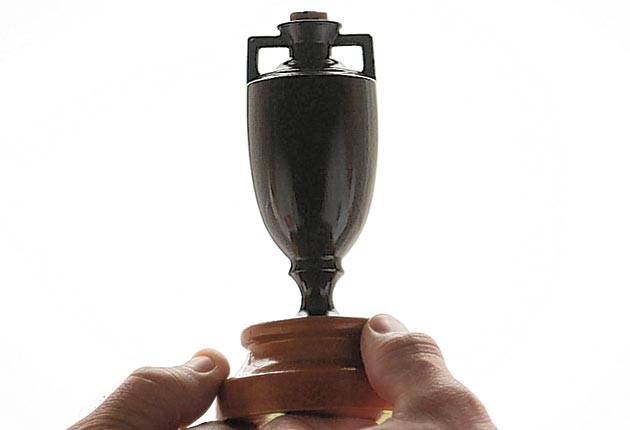Brian Viner: Lord Darnley unveils real contents of his family urn which keeps us up at nights
The Last Word

If you have to be in frosty Herefordshire rather than steamy Brisbane on the eve of the Ashes, you might as well be holed up in the cosy study of Adam Ivo Stuart Bligh, the 11th Earl of Darnley and grandson of one Ivo Bligh who later became the eighth earl.
But more importantly than becoming eighth earl, he was captain of the England cricket team in 1882 and made the throwaway remark that yielded the sporting institution currently responsible for giving us sleepless nights.
Earlier that year, as all cricket enthusiasts know, a mock obituary had appeared in the Sporting Times, following Australia's inaugural Test match victory in England. "In affectionate remembrance of English Cricket," it read, "which died at the Oval on 29th August 1882. Deeply lamented by a large circle of sorrowing friends and acquaintances. RIP. NB The body will be cremated and the ashes taken to Australia."
This, Lord Darnley told me on Wednesday, was a reference not just to a humbling sporting defeat for England but also to the debate raging in Victorian society about cremating human remains. "Hindus were burnt, but civilised Europeans weren't allowed to be," he said, noble tongue in cheek.
Anyway, when the good ship Peshawar arrived in Australia, carrying the England team, Bligh cheerfully quoted the Sporting Times, joking that he had come "to regain the ashes". A fellow passenger on the long voyage had been Sir William Clarke, a wealthy Australian who'd been in England collecting his knighthood from The Queen. Having become friendly with Bligh, Clarke invited the England team to Rupertswood, his estate near Melbourne, to play a friendly prior to the Test matches. And it was at Rupertswood where Lady Clarke – who had been the family nanny before the unfortunate demise in a carriage accident of Sir William's first wife – and her close friend Florence Morphy, the Clarkes' music teacher, playfully handed Bligh a small urn. Here, they told him, were the ashes he'd come for. It is that same urn, symbolically if not actually, that Ricky Ponting now so dearly wants back.
What, though, had been burnt to fill the urn with ashes? In a way it doesn't matter two hoots, or even one hoot, and yet it has been the subject of thousands of speculative column inches down the years, with most people believing the story that it was a bail. Well, probably the only person still living who got the answer from a first-hand source is Lord Darnley's mother, now 94 and still in good health. And the explanation for her excellent source is also the explanation for Lord Darnley's very existence.
Bligh took a considerable fancy to the sparky young music teacher who'd handed over the urn. And she in turn rather liked the look of this tall, dashing Englishman. He returned to England a few months later not just with the Ashes, by now deserving of a capital A, safely in his luggage, but also to ask his parents to approve his proposed marriage to Florence. They refused. So he returned to Australia the following year and married her anyway.
Florence was the present Lord Darnley's grandmother, and she later told his mother, her daughter-in-law, that it had been a veil, easily enough mistaken for the word "bail", that she and her friend Lady Clarke burnt that day. As for the venerable urn itself, Lord Darnley thinks it was a scent bottle, probably taken from Janet Clarke's dressing table. All of which sounds to me like a much likelier story than the many variations that have circulated through the decades, and in Lord Darnley's study on a cold Herefordshire morning it carried proper authoritative weight.
"Grandfather stayed in Australia for a few years after getting married," he added. "My father was born there in 1886. But shortly after that he came back to England, and the Ashes sat on his desk until he died in 1927. Two years later, Grandmother gave them to Lord's, basically for safe keeping." I asked whether the urn still technically belongs to the family, or is it now the MCC's? A kindly, softly spoken man, Lord Darnley gave a gentle chuckle. "I don't know. Put it this way, the secretary of MCC got in touch a few years ago, and said, 'I hope you don't mind, but we're sending them to Australia. I guarantee we'll bring them back'."
That was in 2006-07. They were flown over by Virgin, and Sir Richard Branson unhelpfully suggested, after the Australians had won the series so convincingly, that they should stay there. This time the actual urn remains at Lord's. Let's hope that its spiritual manifestation comes back too.
Voice of racing presents unique case for Beeb's honours list
The mighty amateur golfer Bobby Jones once said that if he were to take everything out of his life except his experiences in St Andrews, he would still have had a rich, full life. Similarly, if one were to take away from Sir Peter O'Sullevan his entire broadcasting career, and all his years of journalism, he would still have contributed uniquely to the world of horse racing.
The charitable trust that bears his name had, by Thursday morning, and in just 11 years, handed no less than £2.6m to equine and other animal welfare charities. By late on Thursday afternoon, following a fund-raising lunch at the Dorchester, that enormous figure had been boosted by several hundred thousand pounds more. I hardly need add that the great man, ramrod straight at 92, spoke with his customary fluency and elegance. When the BBC hands out its lifetime sporting achievement award next month, nobody would begrudge the organisation giving it to one of its own.

Join our commenting forum
Join thought-provoking conversations, follow other Independent readers and see their replies